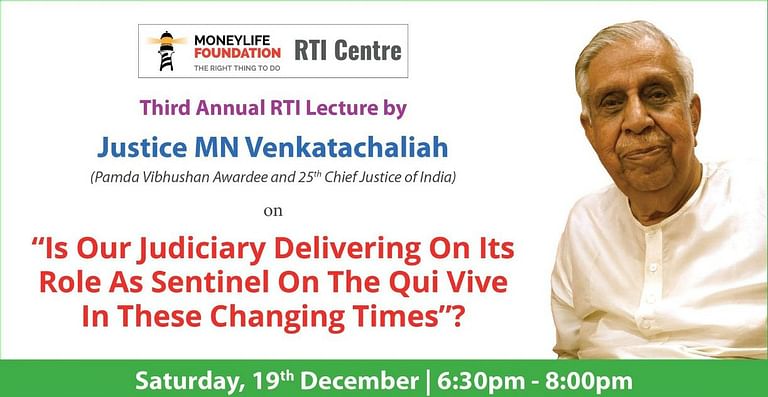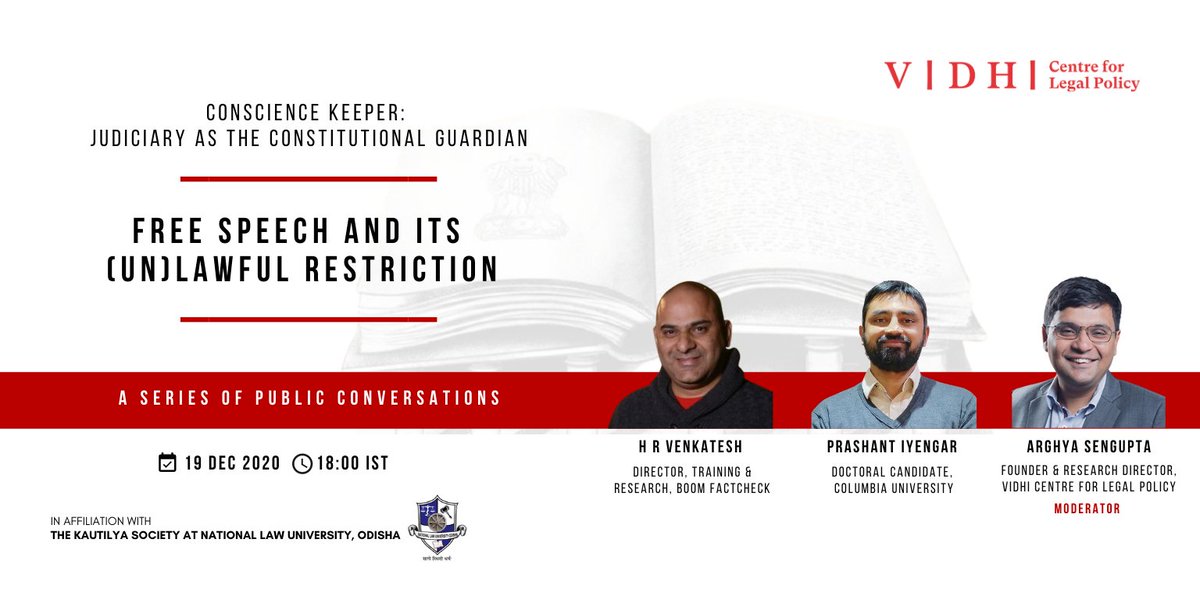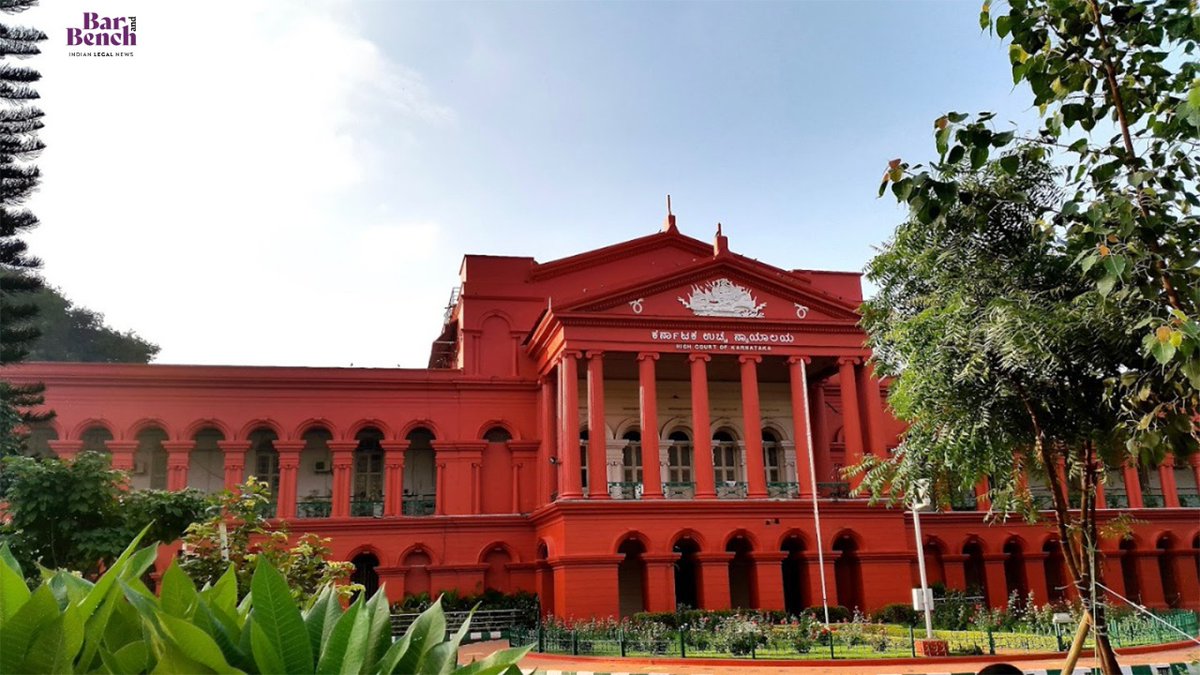
Virtual debate on Death Penalty, hosted by Delhi High Court Women Lawyers Forum, to begin shortly.
Debating in favour: Geeta Luthra, Shweta Kapoor, Kritika Gupta;
Debating against: Kirti Singh, Anup Surendranath, Anubha Rastogi
#deathpenalty
Debating in favour: Geeta Luthra, Shweta Kapoor, Kritika Gupta;
Debating against: Kirti Singh, Anup Surendranath, Anubha Rastogi
#deathpenalty

The session will be moderated by Saumya Tandon and Prachi Dutta.
Watch the session LIVE now:
Watch the session LIVE now:
Saumya Tandon gives the introductory address.
Prachi Dutta informs that the motion for debate is:
"Should India retain or abolish the death penalty?"
#DeathPenalty
Prachi Dutta informs that the motion for debate is:
"Should India retain or abolish the death penalty?"
#DeathPenalty
Geetha Luthra (speaking to retain death penalty): Death, the word has a finality. It's a full stop. It puts to end any debate.
For this reason alone, I say, speaking for the motion - once it has finality, the debate should be and the arguments are in favour of #deathpenalty.
For this reason alone, I say, speaking for the motion - once it has finality, the debate should be and the arguments are in favour of #deathpenalty.
Initially, justice was meant to be retributive, Luthra recounts - followed by deterrence, reformation and finally rehabilitation.
#DeathPenalty
#DeathPenalty
Luthra: Deterrence is the most prevalent view today. Deterrence cannot be an answer. Deterrence is a misplaced theory, which cannot have any place in the criminal justice system.
#DeathPenalty
#DeathPenalty
Luthra: Just visit one of the best jails in our country - walk into #Tihar jail and you would see why you cannot think that criminal law is reformative.
#DeathPenalty
#DeathPenalty
Luthra: Walk into a juvenile justice home and see criminal law does not see justice as reformative or rehabilitative. It may be the way for the future, something we can look at in a idealist society. But today we are in an India of 2020
#DeathPenalty
#DeathPenalty
Luthra: Mercy for the accused should be balanced with mercy for the victim. Nirbhaya's mother would not feel good if the four accused were not given the #deathpenalty because it is not to be retributive.
Luthra: It is a misplaced sense to say we have to show mercy to the accused.
Luthra quotes Agatha Christie: "Mercy detached from justice grows unmerciful."
#DeathPenalty
Luthra quotes Agatha Christie: "Mercy detached from justice grows unmerciful."
#DeathPenalty
Luthra on arguments that #deathpenalty should be abolished since it is irreversible: How many cases have we set aside saying, after 10 years no, 'this was not a case of death penalty'?"
I do not see any
The argument then should, let us be careful
I do not see any
The argument then should, let us be careful
Luthra: You have to have law and order. Look at the countries of the Middle East, South East Asia countries - the law and order is better than in India. One of the reasons is that their punishment is so lethal that anyone is scared.
#DeathPenalty
#DeathPenalty
Luthra: Justice should be more shown. That is the only way you will have better law and order.
#DeathPenalty
#DeathPenalty
Kirti Singh opens debate against the death penalty: I believe that it is cruel, inhumane, arbitrarily given and unreasonable.
#DeathPenalty
#DeathPenalty
Kirti Singh says she would oppose #deathpenalty first on moral grounds. Second, because contrary to popular belief, it is not an effective deterrent
Singh: Fallible criminal justice systems such as ours should not be awarding death penalties because it can never be awarded in a fair and standardised manner.
#DeathPenalty
#DeathPenalty
Singh: The irrevocability of this penalty makes it impossible for the State to correct its mistakes in meting out this punishment.
#DeathPenalty
#DeathPenalty
Singh: Any moral justice system views the reformation of its criminals as part of its responsibility.
#DeathPenalty
#DeathPenalty
Singh: Death penalty serves no purpose which cannot be served by a life sentence, but commits an additional moral wrong by allowing the State to take a life.
#DeathPenalty
#DeathPenalty
Singh speaks of NCRB statistics and a Law Commission report that show that instances of rape in India have increased despite the death penalty and which state that the death penalty does not serve the penological purpose of deterrence.
#DeathPenalty
#DeathPenalty
Singh speaks of having witnessed inefficiency, bias, corruption in the system, the impact of which is felt by the poor and marginalised. It is the poor that suffer the brunt of the death penalty, she adds.
#DeathPenalty
#DeathPenalty
Singh: The truth of the matter is the question of death penalty is not free from the subjective element.
#DeathPenalty
#DeathPenalty
Shweta Kapoor now speaks for the death penalty. She says she will be touching on the sociological perspective.
#DeathPenalty
#DeathPenalty
Kapoor points out that there are a few, limited number of offences for which India prescribes the death penalty: India is not a trigger happy country
#DeathPenalty
#DeathPenalty
Kapoor refers to the Aruna Shanbaug case, where the victim of a rape was left in a vegetative state.
At that point in time, the law did not provide that death penalty for such cases.
#DeathPenalty
At that point in time, the law did not provide that death penalty for such cases.
#DeathPenalty
Kapoor adds that the #deathpenalty for such cases is something which has happened after reform, because the Indian legal system is not static.
But at the time of Aruna Shanbaug's case, the limited punishment for rape was handed over to the accused.
Kapoor: After a few years, he completed his sentence and he was out. He was married, living a normal life.
#DeathPenalty
Kapoor: After a few years, he completed his sentence and he was out. He was married, living a normal life.
#DeathPenalty
Kapoor refers to the Ranga and Billa case, where children were kidnapped and murdered by the two convicts.
Kapoor recounts that whenever the convicts were asked about their crime, the accused replied: "Ranga Khush"
Kapoor recounts that whenever the convicts were asked about their crime, the accused replied: "Ranga Khush"
Kapoor: This man never agreed he was guilty, that he wanted to be reformed. Are we talking about these people who we want to reform? These people are beyond reform.
There are studies of people who have raped and murdered victims at will and at whim, she adds.
#DeathPenalty
There are studies of people who have raped and murdered victims at will and at whim, she adds.
#DeathPenalty
Kapoor: These people come from a mixed bag of society. They come from various sections and not necessary not rich or middle class... demographically they are a mixed class. We cannot say they did not have access to the justice system...
#DeathPenalty
#DeathPenalty
Kapoor touches on retributive justice: People look at the State for justice. The State has to step in,
#DeathPenalty
#DeathPenalty
Dr Anup Surendranth speaks against the Death Penalty: I disagree that it is a "mixed bag". Empirical evidence shows that nearly 75% of death row prisoners in India are poor. 42% belonging to SC/ST communities.
@P39A_nlud
#DeathPenalty
@P39A_nlud
#DeathPenalty
Surendranth says 90% of death row prisoners did not have legal representation, for 80% their lawyers did not discuss their case.
Surendranth: They have terrible legal representation.
#DeathPenalty
Surendranth: They have terrible legal representation.
#DeathPenalty
Surendranth: The reality of a criminal justice system is that there is torture on one end of the system and it is also true that victims find it hard to get justice. Both are true.
#DeathPenalty
#DeathPenalty
Surendranath: There is no point saying we can get better justice for victims by taking away more and more rights of the accused. Both are problems that require their own solutions.
#DeathPenalty
#DeathPenalty
Surendranath referring to cases involving the death penalty says that it would show how pathetic sentencing is in Indian courts.
#DeathPenalty
#DeathPenalty
Surendranath: The suffering of the death penalty is often misunderstood as being at the point of death.
#DeathPenalty
#DeathPenalty
Surendranath: Death row prisoners are kept in barracks that always has a view of the gallows. They are not allowed to meet others. It is the daily anticipation of death - not knowing whether you are going to live or die - that is the true suffering.
#DeathPenalty
#DeathPenalty
Kritika Gupta speaks in favour of death penalty
She asks that while studies have been carried out on death row prisoners: Has a comprehensive study ever been done on the victims of these crimes?
#DeathPenalty
She asks that while studies have been carried out on death row prisoners: Has a comprehensive study ever been done on the victims of these crimes?
#DeathPenalty
Gupta adds that she is not making the crude argument that since we cannot keep prisoners in jail, let them be given the death penalty.
#DeathPenalty
#DeathPenalty
Gupta asks that while prisons are being filled, does it mean we stop giving punishments and do away with the rule of law?
Gupta: There is no need to do away with a punishment given to a criminal in the country.
Gupta: There is no need to do away with a punishment given to a criminal in the country.
Gupta: Our prisons are completely failing in its exercise of reformation and rehabilitation.
Gupta: We need to ask a deeper question - how and in what manner the punishment is to be given.
#DeathPenalty
Gupta: We need to ask a deeper question - how and in what manner the punishment is to be given.
#DeathPenalty
Gupta: Singapore is lauded for its low crime rate. The unique feature there is that it hands out the death penalty even for drug offences, firearms.
It also opposed the abolition of the death penalty, she recounts.
#DeathPenalty
It also opposed the abolition of the death penalty, she recounts.
#DeathPenalty
Gupta adds that Venezuela, which was one of the first to abolish the death penalty is now suffering from the highest crime rate in the world.
#DeathPenalty
#DeathPenalty
In South Africa, where the death penalty was abolished, and where crime has increased since, there was a popular demand to revive the death penalty during the 2019 elections, Gupta says.
#DeathPenalty
#DeathPenalty
Gupta: No one is arguing for mob mentality. But India, a young democracy, has an obligation to take forward various aspirations of its citizens
#DeathPenalty
#DeathPenalty
Anubha Rastogi speaks against the Death Penalty: What is the role of the State? When an offence occurs, it is the State that has failed twice.
It has failed the accused as well because it has failed to prevent the occurrence of the offence, she says.
#DeathPenalty
It has failed the accused as well because it has failed to prevent the occurrence of the offence, she says.
#DeathPenalty
Rastogi: In this, the State cannot now take sides and say "now I am going to avenge what has happened to victim."
It has happened because the State has failed in fulfilling their duty.
#DeathPenalty
It has happened because the State has failed in fulfilling their duty.
#DeathPenalty
Rastogi: The State cannot be in the business of taking revenge.
Whenever there is public outrage, the death penalty is brought in. But what has happened in between when the State was expected to ensure that this will not happen again? she asks.
#DeathPenalty
Whenever there is public outrage, the death penalty is brought in. But what has happened in between when the State was expected to ensure that this will not happen again? she asks.
#DeathPenalty
Rastogi also reads out a report that states that imposing the death penalty for terrorists serves as propaganda for the terrorist movements, which makes their recruitment campaigns more effective.
#DeathPenalty
#DeathPenalty
Sunieta Ojha renders the vote of thanks after the Q&A round. The event comes to a close.
#DeathPenalty
#DeathPenalty
• • •
Missing some Tweet in this thread? You can try to
force a refresh









